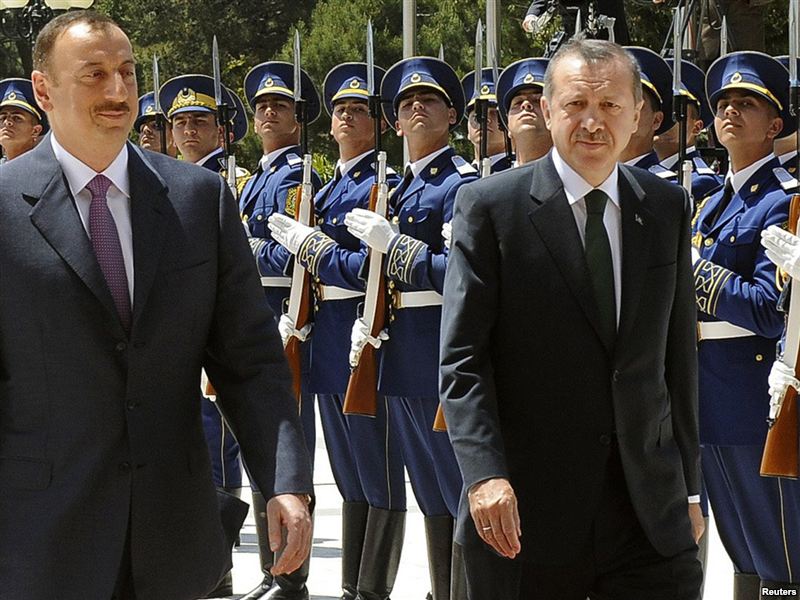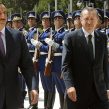
Erdogan Responds to Sarksyan’s Remarks By Backing Azerbaijan
Publication: Eurasia Daily Monitor Volume: 8 Issue: 146
By:

Turkish Prime Minister Recep Tayyip Erdogan paid a one-day working visit to Baku, where he met the Azerbaijani President Ilham Aliyev to discuss various bilateral and regional issues. Erdogan deliberately chose Baku as the destination for his second official trip abroad, since he formed his new government after emerging victorious in the June 12 parliamentary elections. Erdogan’s first trip was paid to the Turkish Republic of Northern Cyprus (TRNC) last week. The choice of these two destinations and the messages delivered during Erdogan’s contacts reflect Erdogan’s determination to stand firm on Turkey’s traditional position on the two important foreign policy issues. In TRNC, Erdogan drew red lines by saying that Turkey would not accept the EU’s terms, and a solution to the Cyprus issue will be based on Ankara’s own priorities. In Azerbaijan, Erdogan reiterated his determination to continue with Ankara’s Baku-centered policy in the South Caucasus.
The improvement of economic ties between the two countries was a key item on the two leaders’ agenda. For his part, Aliyev highlighted the investments by Azerbaijani companies in Turkey, which has exceeded $4 billion, and added that Azerbaijan plans to invest another $6 billion in Turkey, especially in the petrochemicals industry. However, in the long-standing issue of the transit of Azerbaijani gas through Turkey to European markets, the two leaders failed to announce a breakthrough. Erdogan noted that the bureaucrats will continue to work on the remaining articles to finalize a deal, which was reached one year ago.
A concrete outcome of the visit was the announcement of the parties’ determination to hold the first meeting of the High Level Strategic Cooperation Council (HLSC) in Turkey. This form of partnership has been a new instrument, which Turkey has developed to foster its bilateral relations with neighbors and countries deemed to be strategically important. Despite the initiation of such platforms with Iraq, Syria, Greece and Russia, the delay in the conclusion of the Turkey-Azerbaijan HLSC was an issue of concern for some time. To a certain extent, it reflected the ongoing disagreements, caused by Turkey’s thwarted rapprochement efforts with Armenia. Erdogan, thus, emphasized the importance he places on holding the first HLSC, which might be interpreted as yet another sign of a thaw between Ankara and Baku.
An additional issue on which Turkey has sought a breakthrough for some time relates to Azerbaijan’s removal of visa requirements for Turkish citizens. Although Turkey unilaterally lifted visa requirements for Azerbaijani citizens and managed to sign mutual visa liberalization agreements with other countries, including Russia, a similar agreement with Azerbaijan has been on hold. During Erdogan’s Baku trip, Aliyev said that the Azerbaijani side was not ready to move to a visa-free travel regime and would need more time to complete necessary preparations (Anadolu Ajansi, July 27).
Azerbaijani-Armenian problems and the recent developments in Turkish-Armenian relations also occupied a large part of Erdogan’s agenda in Baku. On the eve of Erdogan’s departure to Baku, Armenian President Serzh Sarksyan’s remarks about Mount Ararat (located within Turkey’s borders) shocked observers. Attending the Armenian Language Olympics, Sarksyan responded to a question from an Armenian youth as saying “I think my generation has managed to fulfill its debt when it was necessary to protect the part of our Motherland, [Karabakh], from the enemies. We managed to do it. … “[Any return of historic territories in Western Armenia] all depends on you and your generation” (Hurriyet, July 26).
A statement issued by Turkish foreign ministry strongly condemned Sarksyan’s comments as “extremely irresponsible behavior,” and took them as an indication “that he does not intend to work for peace” (www.mfa.gov.tr, July 26). During his contacts in Azerbaijan, Erdogan also echoed similar messages, going as far as claiming that Sarksyan should issue an apology for his mistake (www.cnnturk.com, July 27).
More importantly, Erdogan capitalized on this development to reiterate his earlier position on the complicated relations between Turkey, Azerbaijan and Armenia. On the one hand, he defined the situation in Karabakh as one of clear occupation by Armenia, which in his view has not demonstrated a constructive attitude toward the resolution of the dispute. Erdogan found Azerbaijan’s approach to the problem constructive, and called on the international community to take the necessary steps for the resolution of the dispute.
On the other hand, Erdogan interpreted Sarksyan’s comments as indication of Armenian’s official position and criticized those who ask Turkey to take steps toward the resolution of its problems with Armenia. Turkish-Armenian normalization, which gained momentum in 2009, had to be stalled partly after Erdogan declared that Turkey would not proceed with its rapprochement unless progress was achieved in the Karabakh dispute (EDM, June 1, 2010). Some have asked Turkey to take limited steps to maintain the momentum in Turkish-Armenian normalization such as the partial opening of the border, even before a solution is reached in the Azerbaijan-Armenian disputes. Referring to these arguments, Erdogan reiterated clearly that Turkey will not proceed with the re-opening of border, before Armenia solves its problems with Azerbaijan (Cihan, July 27).
Erdogan’s reiteration of Ankara’s position was important, especially considering that it was preceded by some positive remarks from Armenian NGO leaders – in Ankara to attend a civil society dialogue – following their meeting with Turkish Foreign Minister Ahmet Davutoglu and Foreign Undersecretary Feridun Sinirlioglu. Reportedly, Davutoglu painted an optimistic picture, expressing his hope that the border will be eventually re-opened and Armenians might even be able to buy homes in Turkey (https://www.tepav.org.tr/tr/haberler/s/2238, July 20). Indeed, this was not the first time Davutoglu expressed his determination to pursue the Turkish-Armenian normalization efforts, despite many obstacles presented by the domestic politics in both countries and the tight coupling between this process and the Karabakh issue (Today’s Zaman, September 30, 2010).
However, against the background of the failure of the Kazan summit to produce any progress on the Azerbaijan-Armenia dispute, Davutoglu has yet to formulate a genuine strategy to break the Turkey-Armenia-Azerbaijan stalemate so that he can proceed with Turkish-Armenian normalization, which would be a major victory for his “zero-problems-with-neighbors” policy. The statements by Sarksyan and Erdogan’s harsh response only add to the complexity of this already daunting task.




